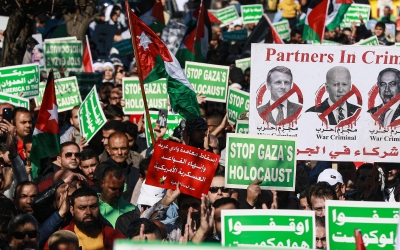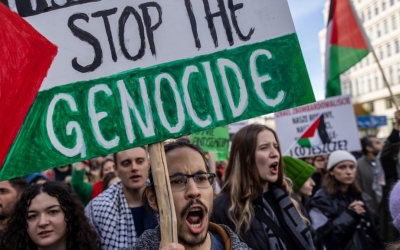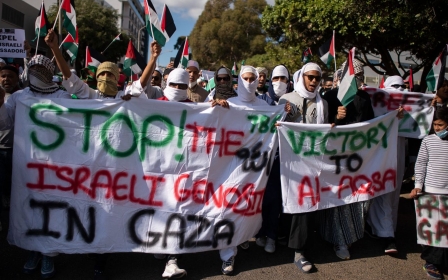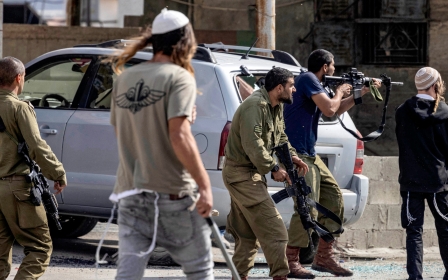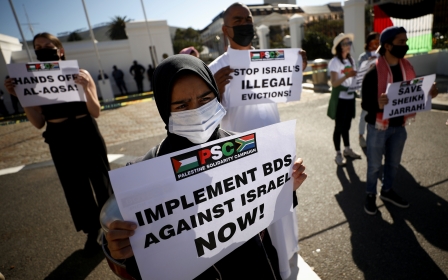War on Gaza: Will South Africa prosecute its citizens fighting for Israel?
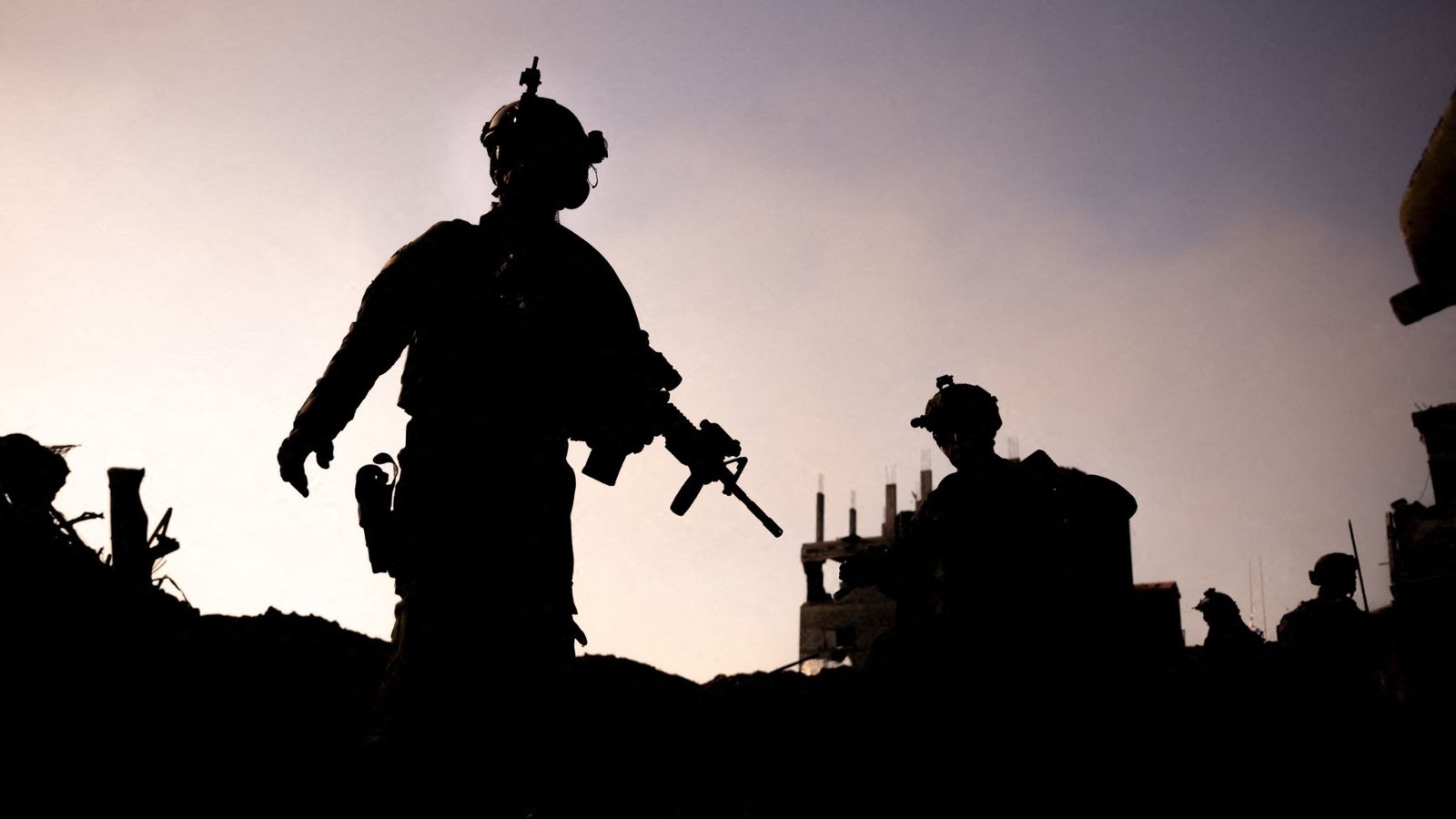
Analysts and legal experts have cast doubt as to whether South Africa will follow through with its pledge and prosecute citizens who are fighting for Israel in the besieged Gaza Strip, given Pretoria's years-long inability to hold dual-nationals accountable for serving in foreign armies.
Early last month, the South African Foreign Ministry said it was "gravely concerned" by reports that some South African nationals were fighting with the Israeli army despite it being prohibited under South African law.
In what was referred to as a watershed moment, the ministry said the State Security Agency (SSA) was tracking down individuals believed to be fighting for Israel and that naturalised citizens, not South Africans by birth, risked being stripped of their citizenship for engaging in a war that the country "does not support or agree with".
Several analysts and experts, however, told Middle East Eye that while they were encouraged by the government's initial statement, the ministry did not actually commit to prosecuting individuals fighting for Israel but simply warned them of the possibility that it could.
The experts said the ministry's statement also failed to explain whether South African authorities would prosecute the men, or if this would be the responsibility of private complainants and legal teams.
New MEE newsletter: Jerusalem Dispatch
Sign up to get the latest insights and analysis on Israel-Palestine, alongside Turkey Unpacked and other MEE newsletters
According to South Africa's Regulation of Military Assistance Act, nationals are not allowed to "offer to render any foreign military assistance to any state or organ of state" without first making an application to the National Conventional Arms Control Committee (NCACC) and subsequently receiving approval from the Minister of Defence and Military Veterans.
Siphiwe Dlamini, a spokesperson for the foreign ministry, did not know how many citizens were believed to be fighting for Israel during its current offensive on Gaza, but told MEE that the agency had never in its history received applications from individuals requesting to fight in Israel.
In the last two decades several South African nationals are known to have participated in Israeli military operations in war-ravaged Gaza.
Following Israel's 2008 offensive in the embattled territory, known as Operation Cast Lead, a team of South African lawyers attempted to prosecute scores of nationals who took part in the fighting which killed more than 14,000 Palestinians.
During the 22 days of fighting, 13 Israelis were killed, including 10 soldiers and three civilians.
According to Yousha Tayob, the lead lawyer on that case, there was sufficient evidence against the 73 South Africans who fought for Israel, but no political will from the South African government to prosecute the men.
"The police put no energy into this case and into gathering evidence," Tayob told MEE.
The case was later dropped with authorities citing a lack of evidence against the accused individuals.
Another case was opened in 2018 against a South African soldier who was known to have fought in the Israeli army's 2014 assault on Gaza which killed more than 2,000 Palestinians, including 500 children.
The lawyers reportedly identified a South African who fought in that war, submitted evidence where he admitted to serving in the Israeli army, added testimony from his own family members and accounts of his actions in Gaza from social media, yet the National Prosecuting Authority (NPA) still refused to prosecute, again citing a lack of evidence.
According to Ziyaad Patel, one of the lawyers on that case, a problematic area for the courts is the soldiers' route of travel into Israel.
"An issue raised by the prosecutors is how the soldiers had left South Africa and how they had entered Israel," Patel told MEE.
"They never travelled directly. They had several passports and always travelled via a third country. This made it difficult for the South African government to follow their trail of movement.”
'Genocidal onslaught'
In recent weeks, the South African government has taken a hardened stance towards Israel and withdrawn all of its diplomats from Tel Aviv over the escalating death toll in Gaza.
More than 21,000 Palestinians are known to have been killed, with about 70 percent of the fatalities identified as women and children.
Last month, President Cyril Ramaphosa toughened his rhetoric and accused Israel of commiting a "genocidal onslaught" in Gaza. On 29 December, authorities filed a case at the International Court of Justice (ICJ) accusing Israel of commiting genocide.
Despite South Africa leading the legal charge against Israel, some activists accused authorities of holding a nonchalant attitude towards South Africans fighting for Israel, citing the difference between the way in which the NPA dealt with the 'Thulsie twins'.
In 2016, two brothers from Johannesburg, Brandon-Lee and Tony-Lee Thulsie were arrested on the charge of trying to leave South Africa and join the so-called Islamic State group, which at that point controlled large swathes of Syria and Iraq.
The duo were arrested before they could leave the country and held for six years before facing trial. They finally reached a plea deal in 2022 where they were handed eight and 11 year jail sentences respectively.
Jo Bluen, the Palestine Solidarity Officer for South African Jews for a Free Palestine (SAJFP), told MEE that several South Africans were known to publicly flout the law which prohibits them from serving in a foreign army, with many openly recruiting new fighters at places such as the Herzlia High School in Cape Town.
"Israeli soldiers regularly visit the school and hold talks with students and they are never told that this is illegal," Bluen told MEE.
Due to the absence of any prosecutions, several activists have questioned whether authorities will take proactive steps this time around.
Ran Greenstein, the author of Zionism and its Discontents: A Century of Radical Dissent in Israel/Palestine, told MEE that South Africa was trying to strike a balance between solidarity with the Palestinian cause without threatening its relations directly with Israel and indirectly with its western allies.
He said that with much of the global south "incensed because of the devastation created by the war, the government is moving towards more radical rhetoric and may even take some active steps".
He continued: "But if things calm down on the frontline, then these steps will not have practical implications and the policy is unlikely to result in a decisive move in one direction or another."
MEE reached out to the South Africa's Department of International Relations and Cooperation (Dirco) and the South African Jewish Board of Deputies for comment but did not receive a response by time of publication.
Middle East Eye delivers independent and unrivalled coverage and analysis of the Middle East, North Africa and beyond. To learn more about republishing this content and the associated fees, please fill out this form. More about MEE can be found here.


